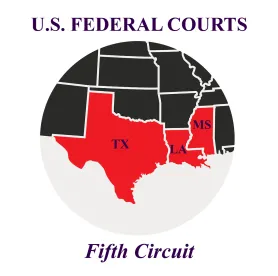Immediately after OSHA published its Emergency Temporary Standard (ETS) on COVID-19 Vaccination and Testing for private sector workers, various individuals, covered employers, states and other groups challenged its validity in federal appeals courts across the country. On November 6, 2021, the Fifth Circuit Court of Appeals, which has jurisdiction over federal judicial districts in Louisiana, Mississippi and Texas, issued a short per curiam opinion staying the ETS pending briefing and expedited judicial review, finding "cause to believe that there are grave statutory and constitutional issues with the mandate."
On November 12, the Fifth Circuit reaffirmed and extended its initial stay, holding that the applicable factors favored a stay of OSHA's ETS:
-
First, the court ruled that petitioners' challenges to the ETS are likely to succeed on the merits.
-
The court found that the ETS exceeds OSHA's statutory authority. Specifically:
-
Petitioners made a "compelling" argument that OSHA has no power to issue an ETS to address an airborne virus that is both widely present in society (i.e., not particular to any workplace) and non-life-threatening to most employees.
-
OSHA failed to demonstrate that all employees covered by the ETS are in fact exposed to COVID-19, as OSHA could not possibly show that every workplace covered by the ETS currently has, has had, or will have positive cases or outbreaks.
-
It remains unclear that COVID-19 poses the kind of grave danger that warrants the issuance of an ETS, considering statements from OSHA and the White House regarding the risks of COVID-19, the status of its spread, and previous lack of intention to mandate a vaccination.
-
The ETS is not "necessary" to alleviate employees' exposure to COVID-19. The court found that the ETS is overinclusive as it fails to account for the differences among workplaces and workers that vary the degrees of employees' susceptibility to COVID-19, and underinclusive because it would exclude protections from vulnerable workers who work in companies that employ fewer than 100 employees.
-
-
The court also determined that other considerations "seal the fate" of the ETS, including that it was intended as an impermissible "stop-gap measure" and because OSHA failed to demonstrate that the protections afforded to workers outweigh the economic consequences to the regulated employers.
-
Further, the court took into consideration its opinion of the "serious constitutional concerns" raised by the ETS, particularly the potential overreach of the federal government's authority under the Commerce Clause and violation of separation of powers principles.
-
-
Second, the Fifth Circuit ruled that the petitioners would be irreparably harmed absent a stay. Specifically, it found that:
-
The liberty interests of individuals reluctant to get a COVID-19 vaccination are substantially burdened because they have to choose between their jobs and getting vaccinated.
-
Companies can suffer irreparable harm from the business and financial effects of losing or having to suspend employees, expending and monitoring costs associated with the ETS, diverting necessary resources, and being subjected to penalties for noncompliance.
-
States have an interest in defending their constitutionally reserved police power over public health authority from federal overreach.
-
-
Third, the Fifth Circuit found that a stay will do OSHA no harm, remarking that "[a]ny interest OSHA may claim in enforcing an unlawful (and likely unconstitutional) ETS is illegitimate." Additionally, the court found that any abstract "harm" to OSHA because of a stay is outweighed by the harms to the individuals and companies in the absence of a stay.
-
Finally, the Fifth Circuit found that a stay of the ETS is "firmly in the public interest." The court observed that the mere specter of the ETS has "contributed to untold economic upheaval in recent months," "from economic uncertainty to workplace strife." Additionally, it found that public interest is served by preserving the "constitutional structure" and "the liberty of individuals to make intensely personal decisions according to their own convictions – even, or perhaps particularly, when those decisions frustrate government officials."
Accordingly, the Fifth Circuit stayed the ETS pending further judicial review of the petitioners' motions for a permanent injunction and ordered that OSHA take no steps to implement or enforce the ETS until further court order.
While the Fifth Circuit's stay of the ETS has nationwide and immediate effect, this is not a final ruling. As petitions to challenge the ETS have been brought thus far in every federal appeals court except the Tenth Circuit, the Judicial Panel on Multidistrict Litigation will randomly select one court of appeals and consolidate the petitions for review in that court. If a different federal circuit is selected through this proceeding, the Fifth Circuit's decision to stay the ETS may be "modified, revoked, or extended" by that selected court. Additionally, any appellate rulings are likely to be appealed to the Supreme Court.
This information is based on the facts and guidance available at the time of publication and may change as the agency receives comments and/or updates its guidance.








 />i
/>i
